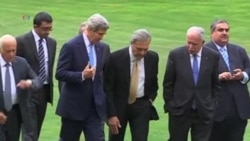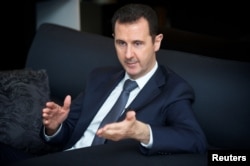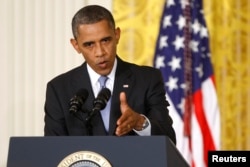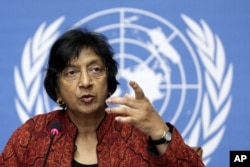U.S. Secretary of State John Kerry says that if President Bashar al-Assad wants to avert an attack on Syria in response to his government's alleged use of chemical weapons he should hand over his entire arsenal by the end of the week.
Speaking Monday in London, the top U.S. diplomat added that he did not believe Assad would take such action and questioned whether it was even possible with a civil war raging in Syria.
Still, Kerry said the Obama administration is convinced that chemical weapons in Syria are controlled by "a very tight network" with the president at its center.
Kerry said global inaction in response to the incident would send the wrong signal to Assad and other U.S. adversaries in the Middle East.
"If you want to send Iran and Hezbollah and Assad a congratulatory message, 'You guys can do what you want.' You'd say, 'don't do anything,''' he said.
"We believe that's dangerous and we will face this down the road in some more significant way if we're not prepared to take some kind of a stand now," Kerry said.
Russian proposal
Russian Foreign Minister Sergei Lavrov announced Monday that Moscow would push its ally Syria to place its chemical weapons under international control and then dismantle them quickly to avert U.S. strikes.
Russian Foreign Minister Sergei Lavrov announced Monday that Moscow would push its ally Syria to place its chemical weapons under international control and then dismantle them quickly to avert U.S. strikes.
Britain and Syria welcomed the Russian proposal.
United Nations Chief Ban Ki-moon said that in a bid to help the U.N. Security Council overcome what he called its "embarrassing paralysis," he may ask the council to demand Syria move its chemical arms stocks to Syrian sites where they can be safely stored and destroyed.
Speaking to reporters in New York, Secretary-General Ban Ki-moon said he may also ask the 15-nation body to demand that Syria join the international anti-chemical weapons convention, a treaty that Damascus has never signed.
Assad denial
In a CBS interview taped in Damascus, Assad denied ordering the August 21 sarin gas attack outside the Syrian capital that Washington says killed more than 1,400 people.
Assad warned the United States "should expect everything" in response to a potential U.S.-led military strike, saying that if "rebels or terrorists in the region" have chemical weapons, they could use them after any American intervention.
"The (Syrian) government is not the only player in this region. You have different parties, different factions, different ideologies," Assad said in excerpts of the interview broadcast on the CBS "This Morning" program.
Asked to elaborate on what response the United States may face, Assad said "I am not a fortune teller who can tell you what is going to happen."
Also Monday, Syrian Foreign Minister Walid al-Moallem said a U.S. military strike could thwart international efforts to convene a peace conference in Geneva to negotiate a resolution to the Syrian conflict. He was speaking at a joint news conference in Moscow with Russian Foreign Minister Sergei Lavrov.
White House push
The Obama administration is launching an intense two-day push to convince Congress and the American people of what it says is the need for a military strike on Syria.
Top security advisers will hold classified and open-door briefings with lawmakers this week. President Barack Obama will give interviews to six major television networks Monday before making a White House address to the nation Tuesday night.
The administration has been handing out videos to its allies, U.S. lawmakers and broadcasters, showing civilian victims of a chemical weapons attack.
U.S. officials say they have evidence that proves beyond any doubt that Assad's army dropped poison gas in the Damascus suburbs last month, killing more than 1,400 people.
U.S. officials want to degrade and deter Syria's ability to use chemical weapons again. They say that doing nothing will lead to more poison gas attacks and a wider war.
Obama has promised to seek congressional approval before responding. But many in Congress have criticized his Syria plan, saying it is unfocused and could embroil the United States in another war.
United Nations inspectors who visited the sites of the August 21 Damascus attack plan to issue a report on it shortly. Kerry said President Obama has not yet decided whether to wait for the U.N. report before taking action on Syria.
UN demands
In Geneva, U.N. High Commissioner for Human Rights Navi Pillay told the U.N. Human Rights Council there is "little doubt" that chemical weapons have been used in Syria. She said it is one of the "gravest crimes" that can be committed.
"The international community is late, very late, to take serious joint action to halt the downward spiral that has gripped Syria, slaughtering its people and destroying its cities," Pillay said.
"This is no time for powerful states to continue to disagree on the way forward, or for geopolitical interests to override the legal and moral obligation to save lives by bringing this conflict to an end," Pillay said.
In the latest fighting on Monday, Syrian troops battled rebel forces in areas around Damascus including a Christian village and in the northern city of Aleppo.
In a video statement, Islamist militants said they are withdrawing from the historic Christian town of Maaloula near the Lebanese border as government forces launched an offensive to retake control. The fighters had vowed to protect the hilltop town after rebels captured its highest peak last week.
Pro-Assad forces also continued to shell rebel-held Damascus suburbs such as Madhamiya, one of the sites of the suspected August 21 chemical attack.
Elsewhere, government airstrikes were reported on rebel positions outside Aleppo, near a strategic highway linking the city with government territory along the coast.
Rebel response
Free Syrian Army rebel commander Abdullah Tlass said American involvement in Syria's two-and-a-half year civil war is the only way to stop the bloodshed.
Speaking to VOA during a visit to family members who sought refuge in Lebanon, Tlass said that if the West does not commit to fighting Assad's government, the war will continue indefinitely. He said the Free Syrian Army will keep trying to defeat the government army and drive Assad supporters out of Syria, even if it takes 100 years.
Tlass defected from the government to the rebels more than a year ago because, he said, he was told to kill innocent people. He said now he commands about 1,300 soldiers, but only 70 percent of them have weapons.
Beirut-based analyst Kamel Wazne of the Center for American Strategic Studies told VOA that the focus of anti-Assad nations on a military response in Syria is misguided.
"We see Syrian children not being taken care for because there's not enough money allocated to alleviate the pain and the suffering.... but we see all of the sudden countries - Arab countries and Western countries - wanting to put billions and billions for war. I think that's a failure of leadership."
Wazne said Free Syrian Army rebels who believe American involvement will end the war underestimate the strength of rival Islamist militants who have drawn jihadis from other parts of the region to fight the Assad government.
"I don't want to see a country next to my country in Lebanon headed by extremists, by al-Qaida, by terrorist organizations that cause a threat to me in my own country," Wazne said.
Additional reporting by Al Pessin in London, Lisa Schlein in Geneva, Edward Yeranian in Cairo, Heather Murdock in Beirut and Michael Lipin in Washington.










